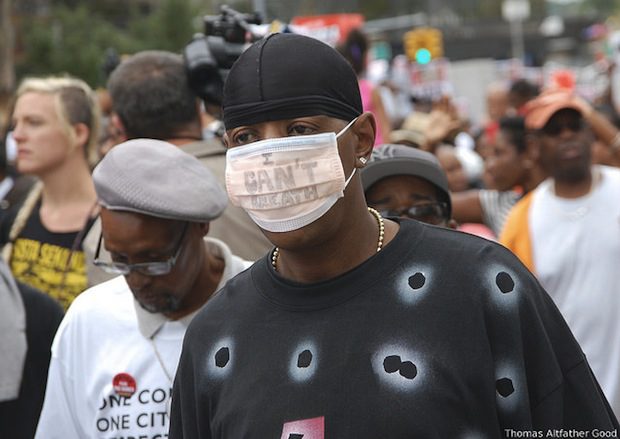Eric Garner & Police Brutality

Yes, the Staten Island grand jury saw and heard a lot more evidence about the police killing of Eric Garner than any of us did. Maybe their decision not to indict was justified. Maybe. But based on the video of the incident, I can’t imagine how. It was brutal, their takedown of Garner. That cop killed helped to kill Eric Garner with that chokehold, which is forbidden by the NYPD. Then his colleagues dogpiled Garner, even after he said he couldn’t breathe. How can a grand jury not even see this as worthy of a trial? There is not even a question of the cops’ lives being in danger from Garner, as there was in the Mike Brown killing.
This is deeply, deeply disturbing. The grand jury proceedings had better be released. I’m trying to be fair about this, knowing that the grand jury had access to weeks of testimony that none of us do, but the video is damning. I don’t blame people at all for protesting this (though God, please let them be peaceful).
Here is what Southern Baptist leader Russell Moore had to say about it. Excerpt:
“I’m stunned speechless by this news. We hear a lot about the rule of law—and rightly so. But a government that can choke a man to death on video for selling cigarettes is not a government living up to a biblical definition of justice or any recognizable definition of justice. We may not agree in this country on every particular case and situation, but it’s high time we start listening to our African American brothers and sisters in this country when they tell us they are experiencing a problem.
“For those of us in Christ, we need to recognize that when one part of the Body of Christ hurts, the whole Body of Christ hurts. It’s time for us in Christian churches to not just talk about the gospel but live out the gospel by tearing down these dividing walls not only by learning and listening to one another but also by standing up and speaking out for one another.”
Maybe, just maybe, a trial would have found these cops not guilty of negligent homicide in Garner’s death. But based on that video, how can there not even be a trial? This is messed up.
UPDATE: Reader Bobby, who is a lawyer, writes:
I watched the video, and I’m not sure what those favoring indictment are seeing. To proceed with an indictment, there has to be some evidence of criminal intent. That’s true even for criminally negligent homicide. I don’t see anything in the video to suggest that the officers did what they did with criminal intent.
Like the Darren Wilson case, this is a case for the civil courts, not the criminal courts. And I think that’s what these grand juries ultimately decided.
UPDATE.2: More wisdom from Bobby:
We all make mistakes at work. The difference is that most of us aren’t called upon to carry out our jobs in life-and-death situations. These police officers, all of whom were smaller than the perpetrator, were called upon to arrest a large, belligerent, man who was resisting arrest. Moreover, he had spent the previous 1-2 minutes lying to the police officer, which doesn’t give his much credibility when he later protests about his alleged breathing problems.
Moreover, I think we have to take into account the expectations we place on police. As white-collar professionals take up residence in the city, we expect police to create an environment that makes us feel as safe as we’d feel on the streets of Rye or Harrison. We expect police to make sure that we don’t have to encounter annoying nuisances like Garner during our walks to work. But we want them to do it in a way that’s neat and clean, and that doesn’t expose the messiness of the racism that’s implicit in what we’re asking them to do.
I was recently riding the train in Chicago. After an annoying black man was escorted off the train by police, I overheard a young woman say the following.
“I don’t understand why they’re still here. We don’t have low-skill manufacturing jobs for them anymore. If they’re not going to conform to societal expectations, it’s simply time for them to go back home to Mississippi. It’s much easier to be poor and have no skills in the country and in a warmer climate.”
We’ve long since stopped trying to address the problems of urban poverty. The goal now is to contain it and to isolate it to a few neighborhoods that lie far from places where respectable people go. And whether we admit it or not, we’re not simply asking police to keep us safe; we’re also asking them to make sure that the refugees remain invisible when they step outside of their refugee camps.
UPDATE.3: Reader Polichinello, quoting from Bobby’s post, then chiming in with a remark of his own:
I don’t understand why they’re still here. We don’t have low-skill manufacturing jobs for them anymore. If they’re not going to conform to societal expectations, it’s simply time for them to go back home to Mississippi.
LOL.
Thus we have the SWPL master plan for their hipsterburgs. Cleanse their metropolises of blacks, and if the rubes in places like Ferguson protest all the new Section 8 neighbors showing up with their social pathologies, call them racist.
Subscribe for as little as $5/mo to start commenting on Rod’s blog.